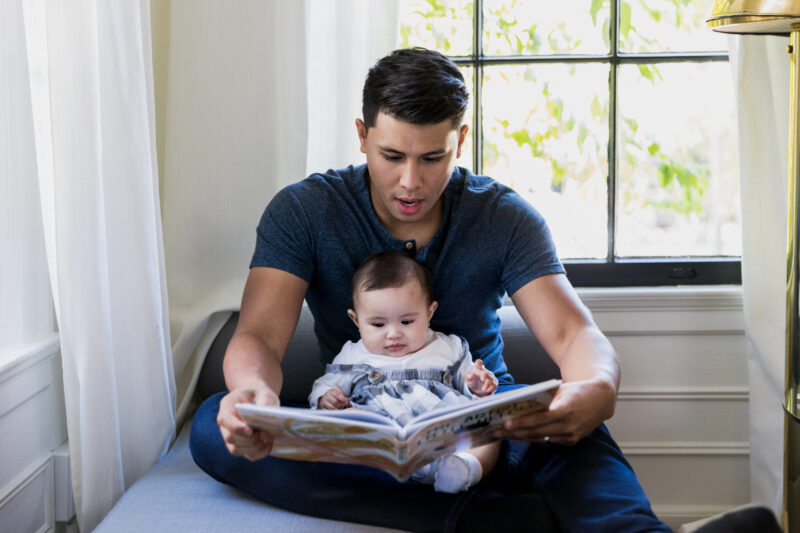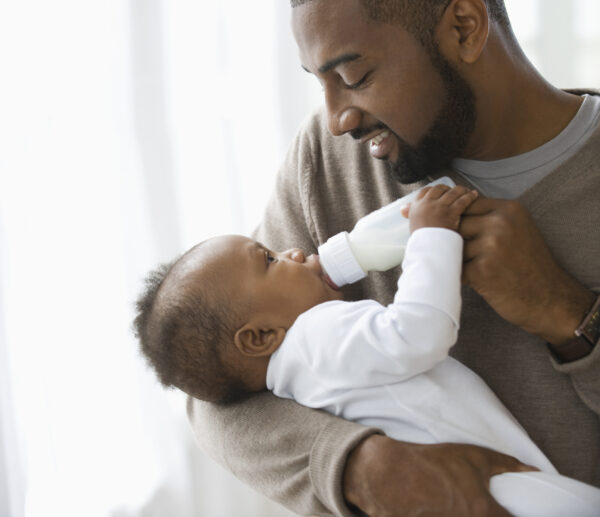 We often hear about the many benefits of mom and baby bonding. That intense attachment between mom and baby fosters a sense of security, promotes positive self-esteem and models a healthy relationship for baby.
We often hear about the many benefits of mom and baby bonding. That intense attachment between mom and baby fosters a sense of security, promotes positive self-esteem and models a healthy relationship for baby.
So much of the focus on baby bonding tends to be placed on mom, but what about dads? Are the benefits of baby bonding true for fathers, as well? Absolutely.
“Moms carried the baby so they have a physical connection already, especially if they’re breastfeeding, so sometimes dads or partners can feel in the background,” said Laura Hlavaty, PhD, pediatric psychologist in Akron Children’s Lois and John Orr Family Behavioral Health Center. “But, research proves babies who have strong bonds with their dads or other parent grow up to have more confidence, higher IQs, and improved language, social and cognitive skills.”
She stresses that bonding with baby might look different for other caregivers. Dads share special activities and tend to interact differently with their babies than moms do — and that’s a good thing.
For example, dads may use different language and inflections, which help language development, and dads tend to encourage imaginative play and exploration of their environment that helps develop problem-solving and social skills.
For dads and partners alike, it’s never too early to get involved, even if you think your baby is too young to remember. All interaction is important in shaping major aspects of your baby’s development.
“By the time babies are 8 weeks old, they can differentiate between mom and dad,” said Dr. Hlavaty. “It’s a powerful time and it can be scary or intimidating, but the earlier dads or partners start can have a big impact and lay the groundwork for secure attachment as baby grows.”
Direct and indirect baby bonding activities
The parent-child bond is a process that strengthens over time through direct and indirect caregiving.
Direct interaction, where dad and baby are face-to-face and actively engaged with one another, is a great way to strengthen and intensify a bond. Indirect interaction, where dad is present, but not interacting one-on-one with baby, helps to build baby’s sense of security. When dad is nearby and available in baby’s life, it communicates that dad will be there for baby in times of need.
There’s no magic formula, but Dr. Hlavaty offers a few activities that can help the process along.

The parent-child bond is a process that strengthens over time through direct and indirect caregiving.
Direct interaction activities can include:
- Caring for baby, such as changing diapers, bathing and dressing baby, baby massage, feeding baby a bottle, holding and rocking baby, comforting baby in distress
- Playing with baby, such as reading and talking directly to baby, singing, making silly faces and sounds, showing baby how certain toys work
- Cuddling with baby, such as skin-to-skin contact, allowing baby to feel dad’s different face textures, mirroring baby’s movements and echoing her coos
Indirect interaction activities can include:
- Doing household chores nearby, such as vacuuming or cooking in the kitchen
- Eating meals together
- Attending doctor visits, even before baby is born, to participate in decisions about care
- Using a baby carrier while doing routine activities
- Taking baby for a walk in a stroller
Can dads develop postpartum depression, too?
It may come as a surprise, but, yes, dads can develop postpartum depression just like moms. In fact, research shows up to 10 percent of dads experience postpartum depression, according to the American Academy of Pediatrics.
“It’s a similar process,” said Dr. Hlavaty. “Dads or partners can begin to feel anxious, overwhelmed or feel down about their ability to parent. If dads develop depression, it can be hard for them to support mom and baby.”
If you’re struggling to bond with your baby or are feeling down, postpartum depression could be to blame. Discuss your concerns with your primary care provider or baby’s pediatrician. There’s no need to feel embarrassed or ashamed about seeking help and treatment. In fact, it’s the best move you can make for both you and your family.
Get to know our pediatricians and schedule a follow-up visit for you and your baby by calling 330-543-2778. Telehealth visits are available.










